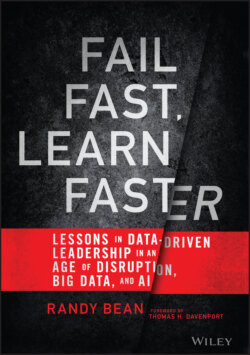Читать книгу Fail Fast, Learn Faster - Randy Bean - Страница 8
PREFACE
Оглавление“Perfect is the enemy of good.”
—Voltaire
I wrote this book during the second winter of COVID-19, 2020–2021. Travel was not an option. I had the time.
I had been writing articles and columns for many years, published in the Wall Street Journal, Forbes, MIT Sloan Management Review, and Harvard Business Review. People asked if I was ever going to write a book. I told them only if it was the next Moby-Dick, or a social comedy or observation of life in the seaside village that I moved to part-time a dozen years ago. Perhaps an updated Peyton Place. My neighbors can breathe a sigh of relief. No kiss and tell this time around.
They say write about what you know. I had never been a Pacific whaler, so I could not rewrite Moby-Dick. However, I had lived and worked for four decades during one of the periods of greatest technological transformation in modern times – the Information Age.
I began my career working in a big bank in Boston (an old bank, too – the motto was “Founded in 1784”). I had no technical skills or business background but was trained by the bank at their expense to be a computer programmer (in Cobol). To my surprise, and maybe the bank's as well, they thought I was good at it and so asked me to keep it up. I grew restless though and moved to the business side of the bank (strategic planning). I was curious about how businesses operate and how decisions were made. Working as a computer programmer, I wrote computer programs that moved data around. I asked what the organization did with all this data, and whether it could be analyzed to arrive at better decisions. I was met with blank stares.
After a decade I joined a company that specialized in data (database marketing) and helping very big companies use that data to better understand their customers – get, keep, grow. One of my customers was Steve Ballmer at Microsoft – even the tech gods believe that to stay on top you need to relentlessly probe the data. It was the Internet era. I went on to become an executive with two Internet startups, and a founding executive (prefunding) of the second one – our lead investors included Kleiner Perkins. It was a whirlwind.
After that failed, and in the wake of 9/11, I needed a change. I launched a management consulting business with a colleague (an MIT PhD computer scientist). Our focus was on data and how big companies could use data to be smarter and better at what they did. I have been doing that ever since.
I wrote this book to tell a story, based on my four decades of business experience in and around data and business transformation. My aim is simple – to educate, provoke, delight, and tease.
When I am not doing business, I happen to sit on the board of a nonprofit where I serve as a chair for what is an internationally distinguished writer's program. These writers have won many book awards, including Pulitzer and Nobel Literature prizes. In the business world, I am called the guy who writes. In the literary world, they call me the guy who is in business. I once shared a collection of my Wall Street Journal columns with one of our board advisors, a head of the English department at a prestigious university – he called them “light and lively.” I am not sure whether this was intended as a compliment or not, but I'll take it.
This book then is intended to be light and lively and engaging, yet also a provocative and in some ways cautionary look at the past two decades in particular – the Big Data era, and how big companies are undertaking data-driven business transformation. I wouldn't ever pretend to be expert in all aspects of Big Data – my business colleagues are more current and have greater expertise in the analytical and technical areas than I do. I have, however, been a highly engaged witness and observer, someone who has operated for decades in and around the center of the Big Data revolution. I understand how organizations care about delivering results and measurable business benefits. When the day is done, nobody cares whether they are using the most elegant algorithm or coolest technology. Simply put, “That stuff don't matter.”
I hope you find this story compelling and informative. Pardon any repetitions. My experience is that you often need to say the same thing, many times, in many ways, for the point to sink in. Nothing is perfect. Perfect is the enemy of good. If you find this book to be thought-provoking and instructive, that would be good enough for me.
Randy Bean
Stonington Borough, CT | Boston, MA
November 2020–January 2021
